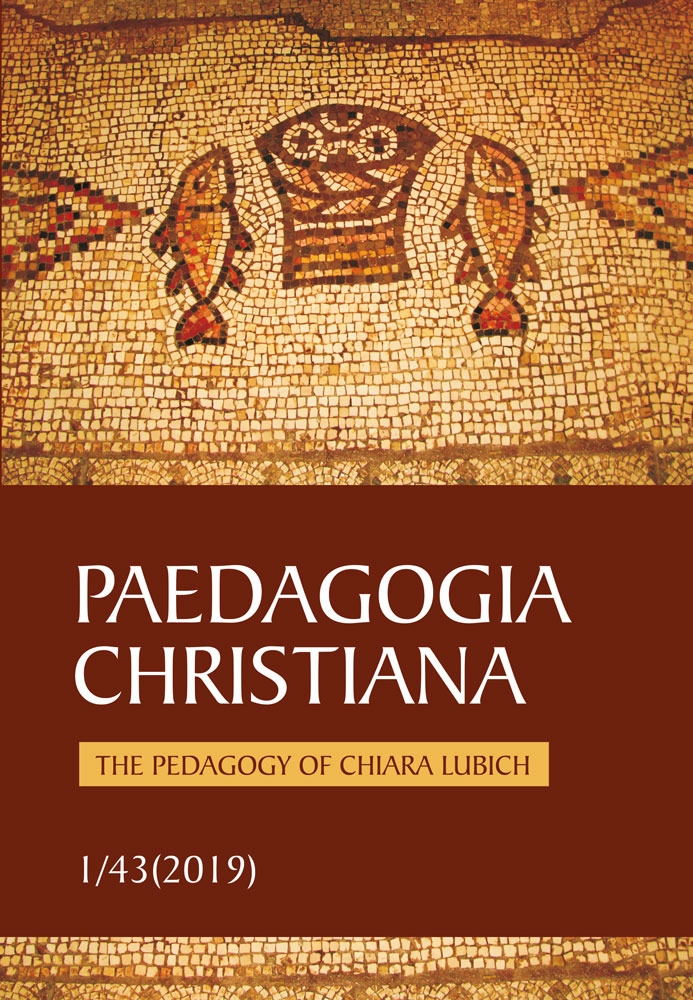Prosociality Inspired by the Charism of the Unity of Chiara Lubich. An Application in the School of Childhood
DOI:
https://doi.org/10.12775/PCh.2019.021Keywords
prosociality, charism of unity, school of childhood, Applied Prosocial Research Laboratory, Participation Action ResearchAbstract
This article presents two distinct parts. The first tries to answer the questions: How do spiritual or religious intuitions apply in life? Or, better, how do certain evangelical passages come to pass when they pass through a structuring of a system of thought? What application characteristics can a certain charism have when analysed and experimentally applied from a scientific perspective and methodology? In this first part, we present a biographical and professional journey of an academic group that started from a concern and experience of a person, the first author, for about 38 years. This group was trying to develop a theoretical-application model initially originated in the educational field and currently active in various areas of human activity, responding to the spiritual charism of a contemporary woman recognised by an institution as universal by the church. The second part shows one of the last experiences of these applications in the educational field. This experience occurs specifically in the infantile age, which is a crucial stage to mark positive tracks in the development of the personality, as well as positive patterns for the later interpersonal and social relations that employ prosociality and cooperation with a very experimental methodology.
References
Bedoya Rodriquez, Ana Esther. Del liderazgo transformacional al liderazgo prosocial: Evidencias obtenidas en la Dirección de organizaciones sanitarias catalanas. Bellaterra: Universidad Autónoma de Barcelona, 2015.
Caprara, Gian Vittorio, Guido Alessandri, Nancy Eisenberg. „Prosociality: The Contribution of Traits, Values, and Self-Efficacy Beliefs”. Journal of Personality and Social Psychology 6/102 (2012): 1289–1303. doi: 10.1037/a0025626.
Cirera Amores, Maria Carme. Estudio cualitativo del liderazgo prosocial: El Proyecto SPRING. Bellaterra: Universidad Autónoma de Barcelona, 2015.
Escotorín, Soza, Gloria Pilar, Robert Roche. Cómo y por qué prosocializar la atención sanitaria: reflexiones, desafíos y propuestas. La Garriga: Fundación Martì L´Humà, 2011.
Escotorín, Soza, Gloria Pilar. Comunicación interpersonal de calidad prosocial: hacia una definición del concepto y síntesis teórica actualizada del modelo aplicable a díadas en contextos organizacionales. Bellaterra: Universidad Autónoma de Barcelona, 2008.
Escotorín, Soza, Gloria Pilar. Prosocial Communication Inquiry in collaboration with gerontology health professionals. Consulta sobre comunicación prosocial con profesionales socio-sanitarios del ámbito gerontológico. Universidad Autonoma de Barcelona. Bellaterra: 2013.
Lencz, Ladislav. „The Slovak Ethical Education Project”. Cambridge Journal of Education 3/24 (1994): 443-451.
Luengo Kanacri, Bernadette P., Concetta Pastorelli, Nancy Eisenberg, Antonio Zuffianò, Gian Vittorio Caprara. „The Development of Prosociality from Adolescence to Early Adulthood: The Role of Effortful Control”. Journal of Personality and Social Psychology 3/81 (2013): 302-312. https://doi.org/10.1111/jopy.12001.
McGinnis, Ellen, Arnold Goldstein. “Programa de Habilidades para la Infancia Temprana”. http://www.oei.es/historico/inicial/articulos/habilidades_infancia.pdf [access: 20.02.018].
Musse, Paul, Nancy Eisenberg. The Roots of Caring, Sharing, and Helping: The Development of Pro-Social Behavior in Children. San Francisco: W. H. Freeman, Nation at Risk, 1977.
Roche, Robert. Hacia una teoria de prosocialidad Lipa. Barcelona: Universidad Autonoma de Barcelona, 2014.
Roche, Robert, Esther Arozarena. “Algunas dimensiones de la comunicación de calidad en la pareja”. Actas de las IX Jornadas Españolas de Terapia Familiar 18 (1988): 425-445.
Roche, Robert, Reinaldo Martínez-Fernández. „Efectos de un programa de entrenamiento prosocial en la comunicación de pareja”. Revista de Tarapia Sexual y de Pareja 24 (2006): 30-50.
Roche, Robert. “Violencia y Prosocialidad: un programa para y descondicionamiento frente a la violencia en la imagen y para la educación de los comportamientos prosociales”. In: Que Miras?, 291-313. Valencia: Publicaciones de la Generalitat Valenciana, 1991.
Roche, Robert. „Comunicación de calidad en la pareja y en las relaciones interpersonales”. Familia y Sociedad 1 (1994): 363-367.
Roche, Robert. „L’educazione alla prosocialità come ottimizzatrice della salute mentale e della à nelle relazioni socialiˮ. Nuova Umanità 21/121 (1999): 29-48.
Roche, Robert. Educacion Prosocial de las emociones, valores y actitudes positivas para adolescentes en entornos familiares y escolares. Barcelona: Blumes, 1998.
Roche, Robert. Eticka vychova. Bratislava: Orbis Pictus Istropolitana, 1992.
Roche, Robert. Inteligencia prosocial: educación de las emociones y valores. Cataluña: Servei de Publicacions Universitat Autònoma de Barcelona, 2004.
Roche, Robert. L’intelligenza prosociale. Trento: Erikson, 2002.
Roche, Robert. Prosocialidad: Nuevos desafios. Metodologías y pautas para una optimización creativa del entorno. Buenos Aires: Ciudad Nueva, 2010.
Roche, Robert. Psicología de la Pareja y de la Familia Analisis y Optimización. Bellaterra: Servei de Publicacions Universitat Autònoma de Barcelona, 2006.
Roche, Robert. Psicología y Educación para la Prosocialidad. Barcelona: Universitat Autònoma de Barcelona, 1995.
Roche, Robert. Psicología y Educación para la prosocialidad. Buenos Aires: Ciudad Nueva, 1997.
Downloads
Published
How to Cite
Issue
Section
Stats
Number of views and downloads: 447
Number of citations: 0



